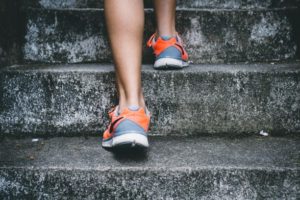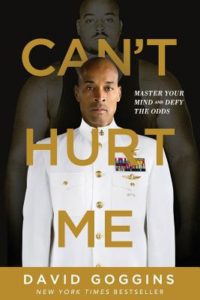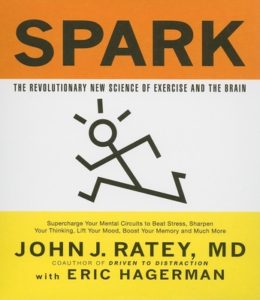If you dread the thought of trading your comfy sweats and trying to squeeze back into “hard pants,” you aren’t alone. Despite the proliferation of online calisthenics, Peloton rides, and nature walks since the start of the pandemic, lots of folks are hoping to shed the “quarantine fifteen.”
 Last month, a new study showed the “chicken-and-egg” relationship between being physically active and a sense of purpose in life. Combine that with the beginning of the summer fitness season, it is a great time to explore related reading.
Last month, a new study showed the “chicken-and-egg” relationship between being physically active and a sense of purpose in life. Combine that with the beginning of the summer fitness season, it is a great time to explore related reading.
I sought advice on rekindling workout passion from my former classmate, Jay Denson, who combines his expertise in digital media and personal fitness, to create the podcast, Fit. Health. Well.
Jay got serious about personal fitness about a decade ago and practices what he preaches. He has run the New York Marathon, gotten his personal trainer’s certification, and been a gym manager, among other fitness feats. Fit. Health. Well features sports experts as well as people using fitness to recover from serious health issues like organ transplant and colon cancer.
You can listen to our brief interview here, where Jay shares his insights and recommends, “Can’t Hurt Me,” a book that inspired him toward a new level of fitness.
 In “Can’t Hurt Me,” former Navy Seal, David Goggins, writes of overcoming world of personal adversity to become a Navy Seal, Army Ranger, AND an Air Force Tactical Air Controller. He’s been described as “The Fittest (Real) Man in America.”
In “Can’t Hurt Me,” former Navy Seal, David Goggins, writes of overcoming world of personal adversity to become a Navy Seal, Army Ranger, AND an Air Force Tactical Air Controller. He’s been described as “The Fittest (Real) Man in America.”
In this ultra-fitness journey memoir, Goggins, addresses some of the societal mindsets that cause us to settle for less than we say that we want and fritter time away: “Our culture has become hooked on the quick-fix, the life hack, efficiency. Everyone is on the hunt for that simple action algorithm that nets maximum profit with the least amount of effort.”
For another dose of motivation, check out “Spark: The Revolutionary New Science of Exercise and the Brain.” The book makes a great case for how even moderate exercise can help jump start not only our bodies, but our brains. Author John Ratey, a physician and Harvard Medical School professor, describes in lay-person language how exercise is our brain’s best friend, and helps improve conditions like attention deficit and mood disorders like anxiety and depression.
 If you are looking for a way to rethink fitness, consider using proven techniques that help change habits and routines. “Tiny Habits” offers pragmatic advice about how we can make small changes that achieve a major impact. It is not a fitness book per se, and the advice doesn’t lean on willpower; but it uses a research-based approach about how to take tiny, incremental actions, to change behavior that will achieve new goals.
If you are looking for a way to rethink fitness, consider using proven techniques that help change habits and routines. “Tiny Habits” offers pragmatic advice about how we can make small changes that achieve a major impact. It is not a fitness book per se, and the advice doesn’t lean on willpower; but it uses a research-based approach about how to take tiny, incremental actions, to change behavior that will achieve new goals.
And as is often the case, wisdom can be found in the simple words of the classics:
“A bear, however hard he tries, grows tubby without exercise.”
Winnie-the-Pooh